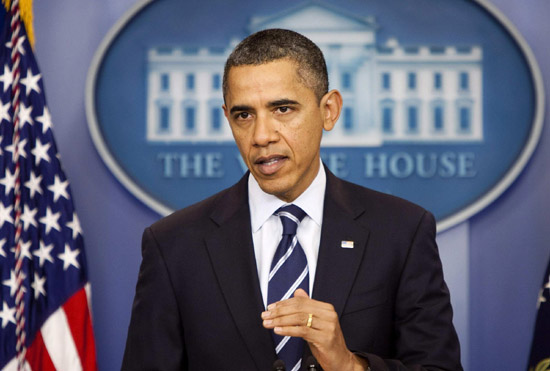US Senate passes payroll tax cut, spending bill
Updated: 2011-12-18 07:38
(Agencies)
|
|||||||||||
WASHINGTON - The US Senate on Saturday approved a two-month extension of the payroll tax cut and a $1 trillion bill to fund the government, resolving the latest in a year-long series of tense political stand-offs but setting up fresh battles for 2012.
Democrats and Republicans were unable to agree on how to pay for a full-year extension of the tax cut and long-term unemployment benefits, as President Barack Obama requested. So senators settled, by a vote of 89-10, for a short-term measure that sets up a debate early next year - just as presidential and congressional election campaigns kick into high gear.
 |
|
US President Barack Obama makes a statement in the White House Briefing Room in Washington December 17, 2011. [Photo/Agencies] |
Economists have warned that a failure to keep the workers' tax cut in place next year would hurt a US recovery already exposed to troubles in debt-stricken Europe. Some said it could lop as much as 1 percentage point off US economic growth.
While it is far too early to know how Congress will address the issue in two months, it will be politically difficult for Congress to let workers get hit with a 2 percent payroll tax increase with elections approaching.
The $33 billion cost of the two-month extension would be covered by increasing fees government-controlled Fannie Mae and Freddie Mac charge lenders to guarantee mortgages. A full-year extension would have cost about $200 billion.
The fees on new mortgage customers would be permanently increased by 10 basis points under the legislation.
Avoiding a shut-down
In a year that saw relentlessly partisan fights over budget, tax and debt legislation, the struggle over the payroll tax cut and jobless benefits measure was a final bruising battle that could set the tone for 2012.
This year, difficulties crossing the partisan divide brought the government to the brink of shutting down three times, pushed it close to a debt default and cost the nation its prized triple-A credit rating.
The $915 billion spending bill that cleared the Senate 67-32 ensures the government will keep running through next September. Obama was expected to promptly sign it into law.
It raises funding for the Defense Department but cuts into budgets at the Environmental Protection Agency, education and health departments and other federal activities.
Congress worked up to the wire to finish the legislation, as agency funds were running out this weekend and federal workers faced layoffs.
The payroll tax cut bill, which keeps the current 4.2 percent tax rate from jumping to 6.2 percent for 160 million workers, still must be approved by the House of Representatives. Kevin Smith, a spokesman for House Speaker John Boehner, said he could not comment on the bill's prospects until leaders consulted with Republican members.
Democrats believe Senate Republican leader Mitch McConnell would not have signed off on the legislation without assurances from Boehner that he could muster the votes for passage.
It was such a difficult year that Senate Majority Leader Harry Reid turned to history to try to put it into perspective.
Reid recounted the 1856 beating in the Senate chamber of a Massachusetts senator by a member of the House. "The times that we are going through here are not unusual for the United States Senate," Reid said. "In fact they're very peaceful and calm compared to some times."
Hot Topics
HIV/AIDS, Egypt protest, Thanksgiving, climate change, global economic recovery, home prices, high-speed railways, school bus safety, Libya situation, Weekly photos
Editor's Picks

|

|

|

|

|

|







